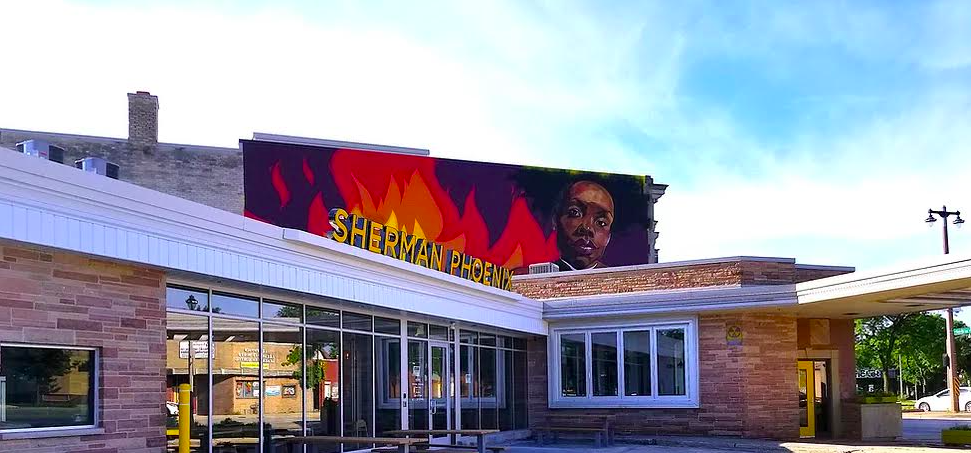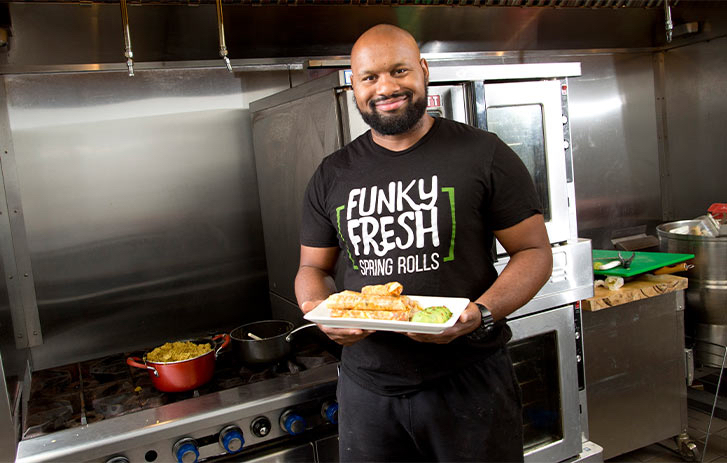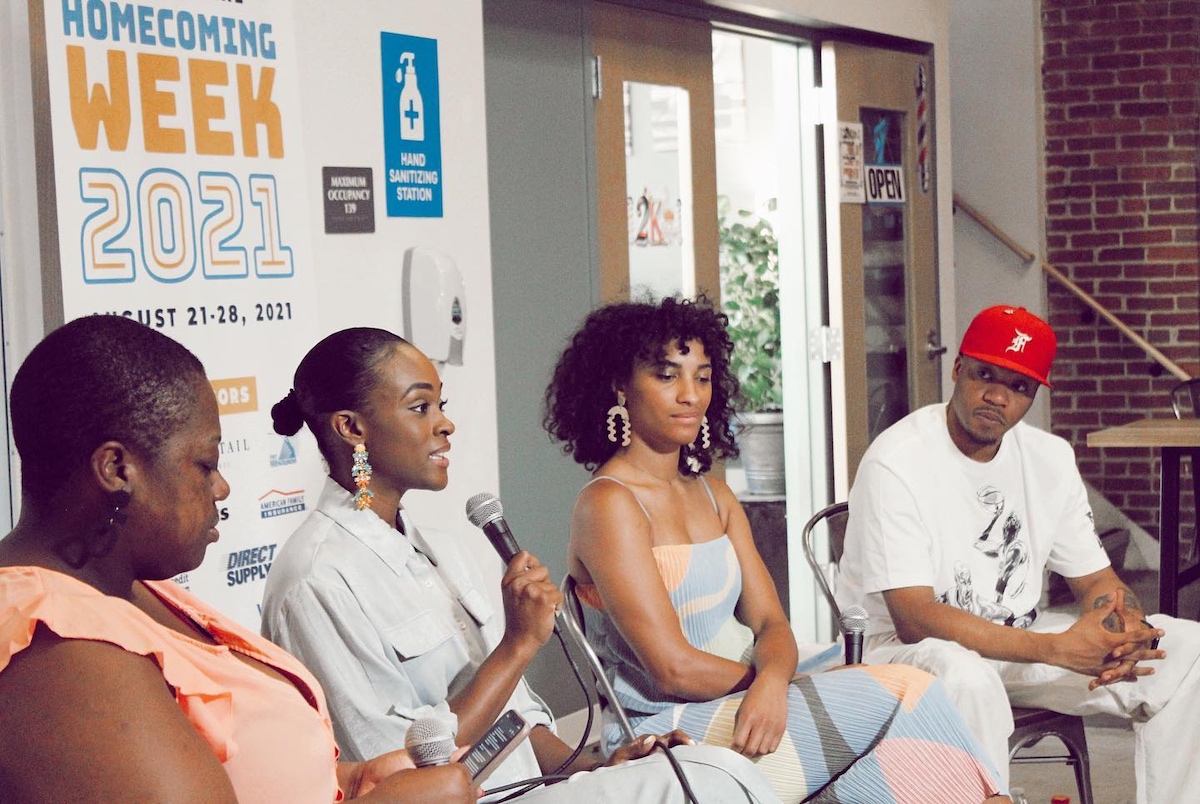At the Sherman Phoenix, a community and business hub seated in the heart of Milwaukee’s West Side, a panel of young Black entrepreneurs shared their journeys with a small, attentive crowd. To the uninitiated, the gathering may have seemed like any other business event taking place across the city. But on this particular Thursday night, it stood as a reminder of how much this neighborhood has had to overcome.
Just five years ago, this site was a BMO Harris Bank location set ablaze in the civil unrest following the fatal shooting of Sylville Smith by a police officer. For more than 10 hours, residents protested the death in the streets, with frustrations mounting into violence and vandalism throughout the night.
“They’re not helping the Black community,” one Sherman Park resident expressed to a local news station at the time.
For Black residents living in the nation’s most segregated metro area, opportunity has been hard to come by. Like so many other cities, Milwaukee’s core neighborhoods experienced high rates of deindustrialization throughout the 1980s and 1990s that left many residents without family-sustaining jobs and local businesses shuttering their doors. The economic disparities were further exacerbated by decades of racial discrimination.
While many residents pondered the future of the Sherman Park neighborhood following the unrest, two local entrepreneurs saw an opportunity for healing in the property left vacant by the bank: a high-quality commercial space for small businesses offering diverse foods, wellness services, and arts and cultural activities.
Aptly naming the site the Sherman Phoenix, founders JoAnne Sabir and Juli Kaufmann secured more than $4 million in funding to bring their vision to life, including from angel investors, the City of Milwaukee, the Wisconsin Economic Development Commission, and the Green Bay Packers. They had three objectives: to transform the vacant property into a thriving community hub; to support entrepreneurs of color through mentorship and coaching; and to build community wealth in an area often neglected by traditional business investment.
Today, the three-story, 20,000-square-foot space at 3536 W. Fond du Lac Ave. is home to nearly 30 small businesses, nearly all Black-owned. Visitors who enter through its doors will find an array of businesses, from clothing and jewelry shops, to hair and nail salons, to restaurants, wellness and counseling centers.

The entrance to the Sherman Phoenix. (Courtesy photo)
But the space has become much more than a business hub on the outskirts of downtown, say patrons and entrepreneurs who’ve set up shop in the space. The Sherman Phoenix has successfully transformed a business district scarred by ashes into a community gathering place where everybody — regardless of race, religion or neighborhood upbringing — is welcome to have a seat at the table.
That was the aim of Social X, a local young professional diversity and inclusion organization, the night they put on the Black entrepreneurs panel in the Sherman Phoenix.
Cofounder Ranell Washington said the event, like so many others held in the building’s common area, was intended to shine a light on Milwaukee’s talented Black entrepreneurs, an enterprise class historically overlooked in the Cream City. With that purpose in mind, the Sherman Phoenix serves a critical void, he added.
“The Phoenix’s existence is a sample of how Black commerce and investment can come into fruition in our urban communities when resources, capital and intentionality are at the forefront of development,” said Washington, who grew up in the Sherman Park neighborhood. “Black entrepreneurship should be celebrated in Milwaukee. The thing that was lacking was a safe cultural establishment to shop, create and gather. There’s no better place to do [that] than the Phoenix.”
The Phoenix’s existence is a sample of how Black commerce and investment can come into fruition in our urban communities when resources, capital and intentionality are at the forefront of development.
No one knows that better than TrueMan McGee, the founder and CEO of Funky Fresh, who stood at the back of the room listening to the panelists. Later, he reflected on his own entrepreneurial journey.
“My first career was as a sheet metal worker, but I personally always loved to cook as a young man,” he said. “I was interested in culinary school, but I didn’t see anyone who looked like me.”
During the Great Recession, when factory work began to dry up, McGee found himself persistently out of work, depressed and weighing over 300 pounds. He embarked on a journey to find happiness, started working out, and researching how to make healthier foods to sustain his hard-earned weight loss.
After shedding more than 60 pounds and launching a personal training business, he began to attract as much attention for his baked fusion spring rolls — made with kale, avocado, sweet potatoes and other healthy ingredients — as he did his intense workouts. In 2016, he turned his full attention to building Funky Fresh, first selling his fusion feasts on Facebook and eventually opening up a space in a local, albeit increasingly abandoned, mall.
It was the same year the Sherman Park uprising grabbed the nation’s attention. McGee remembered watching the night unfold on the local news.
“It was a pretty sad night in Milwaukee,” McGee recalled. “I grew up near the Sherman Park neighborhood and it really showed me that we need people to continue to pay it forward to help develop the community.”
By 2018, McGee took his business to Sherman Phoenix, hoping to make an impact by bringing healthier food options to a traditional food desert. He said the move and newfound exposure provided a jolt to his business, which soared above $100,000 in revenue his first year there.

Funky Fresh CEO TrueMan McGee (Courtesy photo)
Today, Funky Fresh is a crowd favorite, having transitioned from a popular food stand into a serious food manufacturer, with its hot meals and frozen rolls being sold at its cornerstone location inside the Sherman Phoenix and in more than 17 grocery retail locations regionwide — and growing.
McGee said his achievement wouldn’t have been possible if not for the community support he received and a space that has become less like the home of his business and more like family. He said all of the businesses support each other, and have helped transform the Sherman Phoenix into what it has become today: “a hope-filled enterprise rising from the ashes and harnessing the spirit and assets of the neighborhood as a catalyst for unity.”
With the current political turbulence and murder of George Floyd shedding new light on racial and economic disparities, Washington said he hopes the Sherman Phoenix can serve as a positive business model that can be replicated in any urban community, and beyond.
“The Sherman Phoenix was birthed from a very unfortunate and tragic event in the Sherman Park neighborhood and I am hopeful that this institution brings hope and additional resources for the residents and visitors,” he said. “I am grateful Milwaukee is the home for this gem.”
McGee agreed.
“The Sherman Phoenix is a living organism that pumps life, blood, and new businesses into the community; it really is like a new organ in the city,” the entrepreneur said. “We took a negative situation and looked for the opposite. There is no one person’s success. The most important lesson is being united and collectively working together. We would never be as successful standing alone.”
The event offered lessons when considering economic development: respond to the immediate needs of a community, focus on benefitting the people who are already in that community and offer support alongside opportunity. Success can follow.
Before you go...
Please consider supporting Technical.ly to keep our independent journalism strong. Unlike most business-focused media outlets, we don’t have a paywall. Instead, we count on your personal and organizational support.
Join our growing Slack community
Join 5,000 tech professionals and entrepreneurs in our community Slack today!

The person charged in the UnitedHealthcare CEO shooting had a ton of tech connections

From rejection to innovation: How I built a tool to beat AI hiring algorithms at their own game

Where are the country’s most vibrant tech and startup communities?


